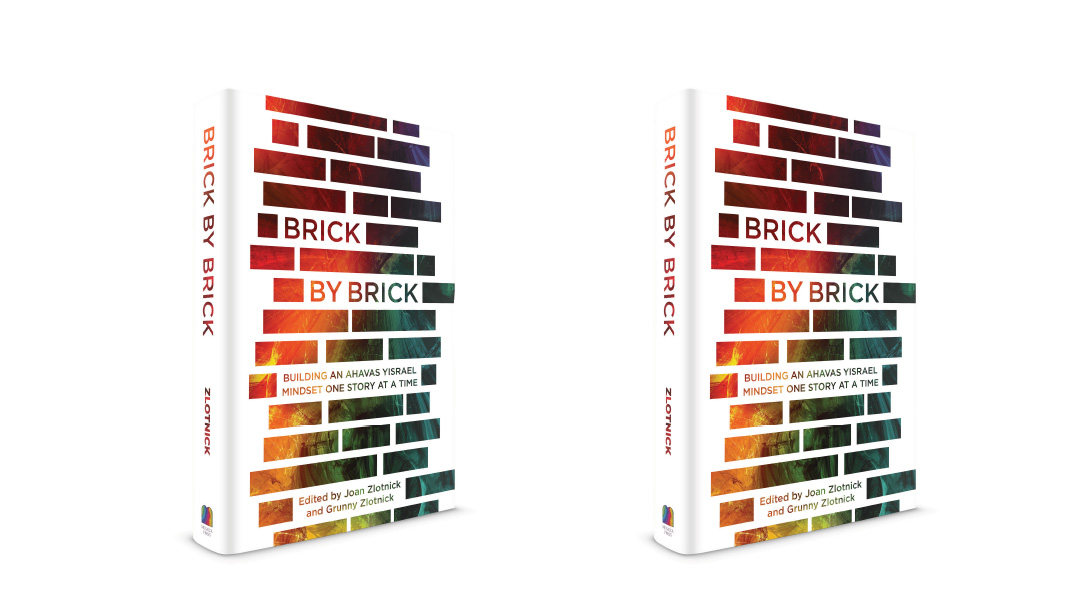On Your Mark…with Esther Kurtz
| December 6, 2022A down-to-earth podcast that aims for the heavens

Esther Kurtz hosts the podcast Emunah for Non-Rebbetzins, making the concepts in Chovos Halevovos accessible and engaging for all.
I’ve always wanted to know how a regular person can grow and develop themselves. So much of the inspiration that we get is provided by people who are, well, inspirational. They either have some kind of amazing life story, or a transformational experience, or they’re super learned and rebbetzin-like.
Very often what they said didn’t feel applicable to me, a regular person. The inspirational person was at the end of a process and sharing what they’d learned, but I was still at point A, and they weren’t telling me how to get to point B, let alone where they were holding.
I always wanted more transparency in the classes I listened to about how up and down real growth is. Growth isn’t a linear process. For example, for a long time, I wanted to be the type of person who said Tehillim daily. My desire was there, but my kriah skills weren’t. Every time I tried, it was so frustrating, I gave up shortly after I started. Only after trying who knows how many times, I finally humbled myself enough to try doing one page a day — not one perek a day, just one page. Finally, I made progress. Now I’m on a 30-day cycle, which is something I never dreamed I’d be able to do.
Working on My Emunah
After the tragedies of Surfside, Meron, and then Stolin, which happened during a time when I was experiencing some personal challenges, I really struggled. It took me longer than I would’ve liked to regain my equilibrium, and I realized that I needed to start taking my spiritual health more seriously.
I’d always understood bitachon as an emotional concept, that we just had to somehow trust in Hashem. I thought that if someone was a good enough person, they would just trust and believe in Him. And if you couldn’t do that, then you had to work on yourself, but I was never clear on what that work was supposed to look like.
I started learning Chovos Halevavos with my husband for just five minutes a night, and I found that there was a lot more to bitachon than just believing. Rabbeinu Bechaye is very logical in how he approaches emunah and bitachon. He discusses the folly of human nature, and includes a lot of psychology and plain old logic. His is a very methodical approach to accessing and growing in bitachon.
This daily learning helped me tremendously, and one thing I’ve learned after sharing many a vulnerable essay is that if I’m dealing with this, I’m not alone in that. If I’d been working on this, and had uncovered all these spiritual, emotional, and intellectual approaches to emunah and bitachon, and was making my way within This World, I wanted to share it with regular people who were probably struggling here, too.
From Paper to Podcast
Naturally, my first instinct was to write a book on the topic. I made a whole spreadsheet of intellectual and emotional approaches, practical exercises to do, and personal stories. I imagined it being sort of a half memoir, half self-help kind of book.
That was my original idea. The idea for the title, Emunah for Non-Rebbetzins, came to me as I was dropping off one of my kids at playgroup. But that exciting brainstorm was followed by another, more pragmatic one when I realized that I couldn’t just come out with this book. Who was going to buy a book on this topic with me as the author? I had no authority. I wanted to put out rebbetzin-level material, but I’m not a rebbetzin.
I’d already been toying with the idea of starting a podcast, and that seemed the perfect medium for the message I wanted to share. I wanted this material to be accessible to what I suspected was an untapped market of people who might be a little edgier than the type of people I imagine listen to a shiur on bitachon. There are so many incredible resources out there for shiurim on the topic, but again, I wanted to reach a slightly different crowd.
My first thought was to just read the English translation of the sefer, but while it is an excellent translation, it’s also fairly dry, and I couldn’t imagine anyone wanting to listen to me read this stiff, formal-sounding translation. So in addition to keeping it short (because who has an attention span these days?), I also needed to make it engaging.
I decided to put out a 90-second lesson on bitachon every day. I would make an audio and video recording, and put it online, as well as on some social media sites. While creating the graphics for it, I went through different backgrounds, but nothing had the vibe I wanted. And then I came across pineapple and was like, “Yes, this feels right.” It’s a fruit, it’s neutral, but it’s quirky. It’s the perfect icon.
I didn’t realize this at the start, but it soon became clear that this was a project tailor-made for my skill set. Everything I know how to do came together beautifully. My teaching and writing skills went into making each lesson succinct and interesting. I knew about podcasts from when I had to teach my students how to do podcasts. I had graphic design experience from creating social media posts for my writing workshops, and I even had a microphone and recording equipment from a project that didn’t even end up needing one. Everything came together so beautifully. It felt so right.
I put together the first four or five thoughts and sent them out to my family and close friends. Would they think it was as interesting as I did? They did. After receiving their approval, I put out flyers announcing the podcast on a few chats, thinking that maybe, if I was lucky, 50 people would sign up. I would’ve been happy even with 20.
What actually happened was that it went a little viral. The first WhatsApp chat filled up right away, and I had to open a second WhatsApp chat, then a third. Before I knew it, I had over a thousand women who wanted to hear Emunah for Non-Rebbetzins.
And then, as is the way with WhatsApp groups, people started leaving, often in batches. The number of group members are the metric that everyone looks at as a marker of success, but it’s a false metric.
I viewed these batches of people leaving as a test of my ego and motivation. I’d ask myself, “Why am I doing this project, anyway? Who am I doing it for? Am I doing it for myself? Or am I doing it for the people who are finding value in it?” If it’s for people who are really interested in learning Chovos Halevavos, then I could be doing it for one person and it would be worth it.
Every time there was a mass of people leaving, I’d feel awful. This is where I saw how my consistent learning about emunah and bitachon had impacted me. I’d tell Hashem that I needed some validation, and I’d always have a random person messaging me, telling me a story that had happened to them related to what I’d taught, or something they learned from the podcast and how it had impacted them, whatever it was. The affirmation always came.
One of the ways Emunah for Non-Rebbetzins is different from other shiurim on this topic is that you learn how to get from point A to point B. It’s very focused on the process, not just the end result.
A lot of what Chovos Halevavos is about is engaging in the process. And in Yiddishkeit we get credit for the process. We need to stop focusing on results and focus on the process. We need to ask ourselves: Who are you becoming in the process?
Rabbeinu Bechaye takes a more limited view of bechirah, where for the most part everything is just meant to be, and our bechirah mostly lies in our responses and reactions. The question is: Who do you become through choosing your response? Whether good or bad, your response is who you are.
This focus on process is the reason I make a new recording each day instead of recording in bulk. While it definitely would be more convenient to record a week at a time, there’s something about sitting and doing it every day. When I sit and work with it, it’s on my mind on a constant basis. And that’s the magic of doing it daily.
You have to do the inner work. The ironic thing is that when you do the inner work, you end up sounding like a rebbetzin. But while it might seem lofty, it’s really also just normal, and I really believe that anyone can, and should, do this.
Begin with Me
Go to Spotify, and start at the beginning. You could also binge-listen. They’re not long. I do recommend that you start at the beginning because the shiurim are systematic and the concepts build on themselves. You have to understand things so you can understand what Rabbeinu Bechaye is talking about later.
If you don’t want to learn with me, that’s fine. Learn Chovos Halevavos with your husband or your friend for five minutes a day. That’s where I started.
I’m not trying to sound dramatic, but it’s really changed my life. I don’t consider myself an overly anxious person, but like many Yiddishe mammas, I can be a little high strung. I have my tightly packed schedules and my cheshbonos of what’s supposed to happen when. Learning Chovos Halevavos has let me breathe. I’m a little worried that I’m losing my edge and I won’t be so sarcastic or dry anymore, but I think I’ll survive.
Most unexpected feedback
I don’t see myself as a calm person, but people keep telling me that my voice is very calming to listen to!
The last thing I read was
Bittersweet by Susan Cain. Like with her last book, Quiet, I feel like she read my mind.
How do I unwind
Unwind??? I have zero ability to chill. I need to learn how to relax. I just finished writing my serial, so maybe I’ll have time to breathe now. Ha!
Favorite snack
Taco chips, hummus, and salsa. Try it! The hummus is the perfect creamy addition. I’ll totally eat that for a lazy lunch.
Something about me that people might not expect
I’m a rule follower. And an instruction reader… but if you make dumb power-play rules, all bets are off. Hmmm… I don’t think that second part is that unexpected.
(Originally featured in Family First, Issue 821)
Oops! We could not locate your form.







